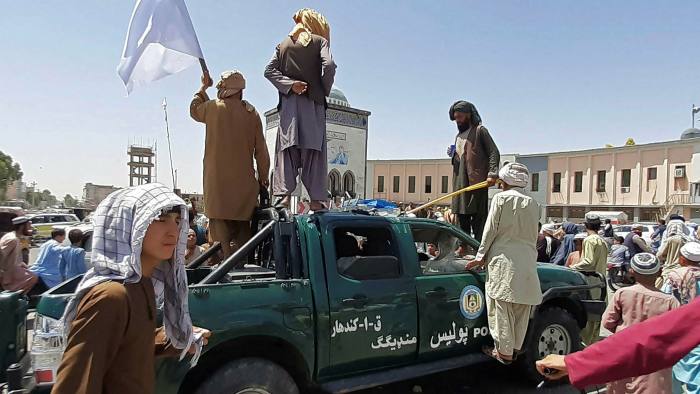|
Listen to article
Getting your Trinity Audio player ready...
|

Nothing substantial emerged from the meeting hosted by Iran with Afghanistan’s neighbours plus Russia on October 27, 2021. However, on November 6, the anti-Taliban resistance leader Ahmad Massoud visited Tehran to meet Ismail Khan, a former Tajik-Afghan warlord, with a message from Tajikistan President Emomali Rahmon on the need for an inclusive government in Kabul. This could be a signal to prepare for confrontation after the winter months.
The Central Asian States, as also Iran and Turkey, are unhappy with the Taliban’s Sunni Pashtun-centric regime and its treatment of various minorities; the rise of Islamic State-Khorasan; and the threat to stability in the region.
As a result, Tajikistan has approved construction of a new Chinese base in Vakhon village, Gorno-Badakhshan Autonomous Province, near the border with Afghanistan (October 27, 2021). The base will be owned by Tajikistan’s Rapid Reaction Group and regular Tajik troops will be present at the facility. Tajikistan has also offered to transfer full control of a Chinese base in Murghab region close to the Wakhan Corridor to Beijing, and waive future rent, in exchange for military aid from China. These developments indicate concerns in Dushanbe and Beijing over the worsening security situation in Afghanistan.
Adding to the alarm, the IS-K is making strides inside Afghanistan. The November 3 attack by IS-K on Kabul’s Daud Khan military hospital that left at least 25 dead is ominous. Most IS-K cadre are drawn from the Tehrik-e-Taliban Pakistan (TTP) and the Afghan Taliban. Given China’s growing proximity to the Taliban, the IS-K is trying to recruit more Uighurs into its ranks. The Wall Street Journal has reported that intelligence members of the previous regime are joining IS-K for income as well as to resist the Taliban.
The Delhi Declaration (November 10, 2021) following India’s well-attended meeting on Afghanistan underlined global fatigue and resigned acceptance of the Taliban regime, though diplomatic recognition is unlikely given its resistance to forming an inclusive government, refusal to let women work as their families starve or to let girls back to school, and continued violence against men and women who served the previous regime. The attendees (India, Iran and Russia, and five Central Asian nations) reiterated commitment to a peaceful, secure and stable Afghanistan, and respect for the sovereignty, unity and territorial integrity of Afghanistan.
The meeting struggled for unanimity, but Pakistan and China abstained and put a spoke in the wheels. Russia signed the Delhi Declaration but later released a statement diluting issues of fighting terrorism and safeguarding the “human rights” of children, women and minorities. This was not driven by innate differences, but by Moscow’s wish to engage the Taliban at Pakistan’s Troika-plus meeting with Taliban representatives (November 11, 2021).
The Delhi Declaration emphasised the problems of drug trafficking; refuge to terrorist groups and leaders; and the impending humanitarian crisis. The need for inclusion of ethnic minorities was highlighted. But the need for humanitarian assistance was prioritised, to be delivered in an “unimpeded, direct and assured manner”. Essentially, the countries did not want aid to be delivered via the Taliban. However, recently Pakistan prevented India from sending wheat to Afghanistan, though it has now said it will reconsider the matter.
Within Afghanistan, Friday mosque bombings are becoming a signature tune of the Taliban regime. On Friday, November 12, 2021, a mosque in Terallai village, Spinghar district, Nangarhar province, was bombed, taking at least 35 lives at the time of writing. Several were injured, including the imam. Previously there were blasts in mosques in Kandahar and Kunduz.
Continuing its intolerance to non-Islamic practices, Wahidullah, 19, was shot dead in Zargaran village in Badakshan province because he was listening to music, according to a report in Hasht Subh newspaper. Daily the number of incidents, including missing persons, rises. According to a UNICEF report, till August 2021, 550 children were killed and more than 1400 injured in clashes and bomb blasts in Afghanistan, mostly from Taliban attacks, though around 20 per cent were from the ISIS.
Two women and two men were shot dead in Faqirabad district of Balkh on November 5, including a woman who served in the security forces of the former governor. The same day, the bodies of Forouzan Safi and three other female activists were found in a pit in the first district of Mazar-e-Sharif. Safi’s husband fled to Iran to escape threats to this life. The previous day, a teacher, Qurban Ali, was shot with his hands tied in his back, in Suf Valley of Samangan province.
In a tweet on October 30, 2021, former vice president Amrullah Saleh said the Taliban militia killed 13 persons to silence music in a wedding party in Nangarhar. Meanwhile, women are still not allowed to work; many are seeking political asylum as families face starvation. The Afghanistan Chamber of Commerce and Investment announced on October 28 that more than 40 businessmen were abducted in the past two months and most have been killed.
Humanitarian aid has been pledged but not delivered. China promised more than $35 million worth of humanitarian aid. The G20 summit (October 2021) reaffirmed its pledge to send $ 1.15 billion in humanitarian aid to Afghanistan. The European Commission announced that the European Union has pledged €1 billion, with the condition that the Taliban accept five benchmarks, viz., prevent Afghanistan from again becoming a breeding ground for terrorism; respect for human rights, rule of law, and guarantees for media freedom; allow other political forces into transitional government; grant free access to humanitarian aid respecting EU procedures and conditions for delivery; and grant free passage to those who want to leave the country.
The EU was emphatic that the aid would not go to the Taliban, but would be distributed via international organizations and NGOs on the ground. This appears to be the main stumbling block.






Add comment